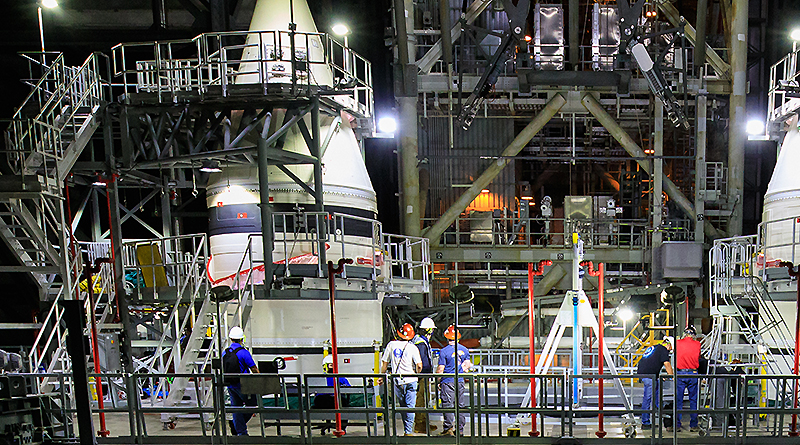Degree Spotlight: Space Systems Engineering
February 14, 2022 - Rick Robb

The past few years have seen proliferation of news stories regarding the future of space travel. NASA announced plans to return to the moon using their Orion spacecraft. The U.S. Space Force became the newest American military branch. Meanwhile, SpaceX, Blue Origin and Virgin Galactic compete in the private sector with an array of spacecraft and reusable rockets for industrial and commercial purposes including space tourism. Human travel to Mars appears to be within reach.
While certain wealthy individuals may grab the headlines, the unsung heroes behind the success of these programs are the space systems mechanical and electrical engineers. Working for government agencies, defense contractors, or private companies, space systems engineers help design, build, and test the various subsystems that make for successful missions. In some cases, they may even serve as astronauts.
The Space Systems Engineering program from The University of New Mexico was one of the first master’s-level space engineering programs in the country. It is offered fully online and designated as one of the Accelerated Online Programs, which feature eight-week classes that are highly flexible and affordable with flat per-credit-hour tuition rates.
Students have the choice between two degrees—the Space Systems Engineering program leads to a Master of Science in either Mechanical Engineering or Electrical Engineering.

“The basis of the program is spacecraft design, which involves a variety of technical topics primarily from mechanical and electrical engineering, as well as mathematics and physics,” Dr. Chris Hall, professor emeritus in the Department of Mechanical Engineering at UNM, said in a recent interview.
Hall has been a space systems professional since 1984, has a 20-plus-year academic career, and is a Fellow of the American Astronautical Society and an Associate Fellow of the American Institute of Aeronautics and Astronautics. A critical part of UNM’s Space Systems Engineering program, he explained more about its background and design.
Developing a Unique Space Systems Program
“When we first conceived the program, there were no online master’s-level programs in the U.S., but there was certainly interest in the field,” Hall said. “By the time we implemented this program, there were a couple of other programs being deployed by other universities.”
In addition to being one of the first programs of its kind in the country, the Space Systems Engineering program was developed with input from the Air Force Research Laboratory (AFRL) Space Vehicles Directorate at Kirtland Air Force Base in Albuquerque.
“Through the UNM–AFRL Educational Partnership, we worked with our counterparts at AFRL to establish the topics that would be included in the program, and to identify members of the AFRL staff who might teach courses in the program,” Hall said. “We also identified members of the Sandia National Lab (SNL) staff to teach courses in the program.”
One unique aspect of the program is the fact that graduate students in two quite different fields — mechanical engineering and electrical engineering — work together throughout the program, sharing their different academic and professional backgrounds with other students. Having courses taught by AFRL and SNL staff who work in related fields is also a unique feature of the program.
The program takes advantage of Hall’s impressive background as both a practitioner and an academic. After arriving at UNM in 2011, he taught online exclusively, and the M.S. program with emphasis in Space Systems Engineering uses all of the courses that he taught.
Hall first enlisted in the U.S. Air Force (USAF) in 1978. In 1981, he was selected for the USAF’s Airman Education and Commissioning Program, which took him to Auburn University for a B.S. in Aerospace Engineering. After Officer Training School, he worked at Sunnyvale Air Force Station on systems integration for the ground support systems used to “fly” unique intelligence-oriented spacecraft. Still in the Air Force, he earned his M.S. in Systems Engineering at the Air Force Institute of Technology (AFIT) followed by a Ph.D. in Theoretical and Applied Mechanics from Cornell University.
After graduating from Cornell, Hall began his academic career as a USAF Captain teaching in the Department of Aeronautics and Astronautics at AFIT, including courses in orbital mechanics, attitude dynamics and control, spacecraft design, and nonlinear differential equations. He then spent 14 years at Virginia Tech as a faculty member in the Department of Aerospace and Ocean Engineering. In one interesting project at Virginia Tech, Hall and his students built a unique experimental facility called the Space Systems Simulation Laboratory, where they conducted hardware-in-the-loop experiments on formation flying spacecraft.
Hall is also a recognized expert on the dynamics and control of spacecraft. He retired from The University of New Mexico at the end of the Fall 2021 semester, though his legacy continues.
Career Outcomes with a Master’s Degree in Space Systems Engineering
“Graduates will have a firm foundation for working in spacecraft design, manufacturing, and operations professions,” Hall said.
Master’s-level positions at the Department of Defense, NASA, and private sector aerospace are a few examples of employers that graduates from the Space Systems Engineering program can consider. Specializing in an area like project management, mission planning, navigation and structural analysis, or spacecraft integration activities is possible.
Students in the program come from a wide range of backgrounds.
“Many of our students are already working in these fields and share their experiences with the other students,” Hall said. “Some of our students are fresh graduate students who have just completed their B.S. in Mechanical Engineering or Electrical Engineering, while others have been working as engineers for many years. Both groups of students benefit from the coursework.”
UNM’s Space Systems Engineering program was recently recognized at the top of the Most Affordable Online Master’s in Aerospace Engineering, Electrical Engineering, and Mechanical Engineering lists by OnlineU.org.
Whether you’re an engineer with several years of experience or someone who has just graduated with a bachelor’s degree in engineering, physics, or mathematics, you can pursue your Space Systems Engineering degree from UNM—as an M.S. in Mechanical Engineering or M.S. in Electrical Engineering.
Discover how this unique, flexible, and affordable program can fit into your career.
